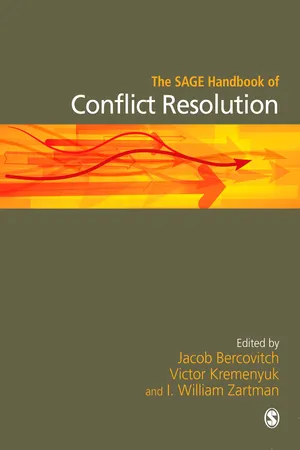
The SAGE Handbook of Conflict Resolution
- 704 pages
- English
- PDF
- Available on iOS & Android
The SAGE Handbook of Conflict Resolution
About this book
?Bercovitch, Kremenyuk and Zartman are among the most important figures in the conflict resolution field. They have pieced together, with the help of more than 35 colleagues from numerous countries, a state-of-the-art review of the sources of international conflict, available methods of conflict management, and the most difficult challenges facing the individuals and organizations trying to guide us through these conflict-ridden times. The collection is brimming with penetrating insights, trenchant analyses, compelling cases, and disciplined speculation. They help us understand both the promise of as well as the obstacles to theory-building in the new field of conflict resolution? - Lawrence Susskind, Professor and Director of the MIT - Harvard Public Disputes Program
?The last three sentences of this persuasive book: "We conclude this volume more than ever convinced that conflict resolution is not just possible or desirable in the current international environment. It is absolutely necessary. Resolving conflicts and making peace is no longer an option; it is an intellectual and practical skill that we must all posses." If you are part of that "we," intellectually or professionally, you will find this book a superb companion? - Thomas C Schelling, Professor Emeritus, Harvard University and University of Maryland
Conflict resolution is one of the fastest-growing academic fields in the world today. Although it is a relatively young discipline, having emerged as a specialized field in the 1950?s, it has rapidly grown into a self-contained, vibrant, interdisciplinary field. The SAGE Handbook of Conflict Resolution brings together all the conceptual, methodological and substantive elements of conflict resolution into one volume of over 35 specially commissioned chapters. The Handbook is designed to reflect where the field is today by drawing on the contributions of experts from different fields presenting, in a systematic way, the most recent research and practice.
Jacob Bercovitch is Professor of International Relations, and Fellow of the Royal Society, at the University of Canterbury in Christchurch, New Zealand.
Victor Kremenyuk is deputy director of the Institute for USA and Canada Studies, Russian Academy of Sciences, Moscow. He is also a research associate at IIASA.
I. William Zartman is Jacob Blaustein Professor of Conflict Resolution and International Organization at the Nitze School of Advanced International Studies of Johns Hopkins University
Frequently asked questions
- Essential is ideal for learners and professionals who enjoy exploring a wide range of subjects. Access the Essential Library with 800,000+ trusted titles and best-sellers across business, personal growth, and the humanities. Includes unlimited reading time and Standard Read Aloud voice.
- Complete: Perfect for advanced learners and researchers needing full, unrestricted access. Unlock 1.4M+ books across hundreds of subjects, including academic and specialized titles. The Complete Plan also includes advanced features like Premium Read Aloud and Research Assistant.
Please note we cannot support devices running on iOS 13 and Android 7 or earlier. Learn more about using the app.
Table of contents
- COVER
- Dedication
- Contents
- Author Biographies
- Acknowledgements
- Introduction: The Nature of Conflict and Conflict Resolution
- PART I - History and Methods of Study
- 1 The Evolution of Conflict Resolution
- 2 Diplomacy and Conflict Resolution
- 3 Conflict Resolution in the International System:A Quantitative Approach
- 4 Case Studies and Conflict Resolution
- 5 Game Theory as an Approach to Conflict Resolution
- 6 Experimental Research on Social Conflict
- 7 Doing Conflict Research Through a Multi-Method Lens
- 8 Problem-Solving Approaches
- 9 Constructivism and Conflict Resolution
- PART II - Issues and Sources of Conflict
- 10 Territory as a Source of Conflict and a Road to Peace
- 11Economic and Resource Causes of Conflicts
- 12 Resolving Ecological Conflicts: Typical and Special Circumstances
- 13 Ethnicity, Negotiation, and Conflict Management
- Ethno-Religious Conflicts:Exploring the Role of Religion in Conflict Resolution
- PART III - Methods of Managing Conflict
- 15 Conflict Prevention: Theory in Pursuit of Policy and Practice
- 16 Conflict Resolution and Negotiation
- 17 Mediation and Conflict Resolution
- 18 The Settlement of International Disputes by Legal Means – Arbitration and Judicial Settlement
- 19 Dialogue as a Process for Transforming Relationships
- 20 NGOs and Conflict Resolution
- 21 United Nations Mediation Experience: Practical Lessons for Conflict Resolution
- PART IV - Current Features and Dilemmas in the Study of Conflict Resolution
- 22 Terrorism and Conflict Resolution
- 23 Media and Conflict Resolution
- 24 Democracy and Conflict Resolution
- 25 Why Mediation Matters:Ending Intractable Conflicts
- 26 Culture and Conflict Resolution
- 27 Peacekeeping and Beyond
- 28 Reconciliation as a Peace-Building Process:Scope and Limits
- 29 Assessing Outcomes: Conflict Management and the Durability of Peace
- 30 Peace vs. Justice – and Beyond
- 31 The Spread of Civil War
- 32 Conflict Resolution and Human Rights: The State of the Art
- 33 Resolution of Military Conflicts and Confrontations (Force and Arms Control)
- 34 Training and Education
- Conclusion: Emerging Problems in Theory and Practice
- Index